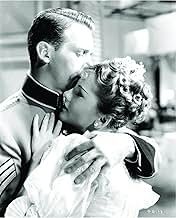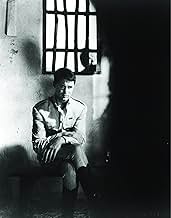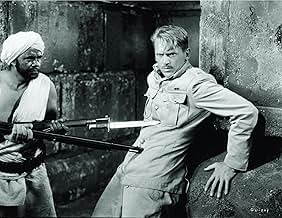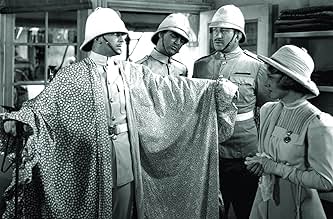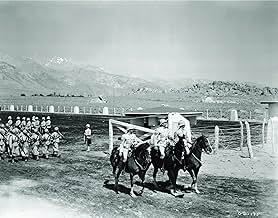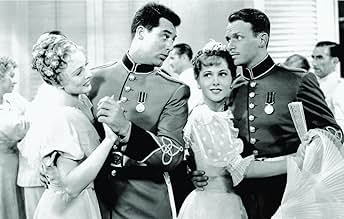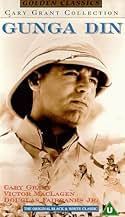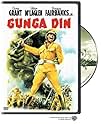IMDb-BEWERTUNG
7,2/10
13.384
IHRE BEWERTUNG
Im Indien des 19. Jahrhunderts müssen drei britische Soldaten und ein einheimischer Wasserträger eine geheime Massenwiederbelebung des mörderischen Thuggee-Kults stoppen, bevor er im ganzen ... Alles lesenIm Indien des 19. Jahrhunderts müssen drei britische Soldaten und ein einheimischer Wasserträger eine geheime Massenwiederbelebung des mörderischen Thuggee-Kults stoppen, bevor er im ganzen Land wüten kann.Im Indien des 19. Jahrhunderts müssen drei britische Soldaten und ein einheimischer Wasserträger eine geheime Massenwiederbelebung des mörderischen Thuggee-Kults stoppen, bevor er im ganzen Land wüten kann.
- Auszeichnungen
- 4 wins total
Charles Bennett
- Telegraph Operator
- (Nicht genannt)
Gene Coogan
- Lancer
- (Nicht genannt)
Jimmy Dime
- Thug
- (Nicht genannt)
George Du Count
- Pandu Lal
- (Nicht genannt)
Anna May the Elephant
- Elephant
- (Nicht genannt)
Empfohlene Bewertungen
Although I'm usually only mildly appalled reading through user comments on movies on imdb.com some of the comments made here about this classic movie exhibit a true nadir of ignorance of history in general and movies in particular. E.g.;
1 - I'm particularly struck by the comment - "This movie is shot on location in California because shooting in India would have been too expensive." Prior to the 1950's Hollywood movies were rarely (and I mean rarely) shot on the original location sites. The problem was not expense (although the moguls certainly were pinching the pennies), the problem was transportation! Transporting a movie production company halfway around the world would have been nearly impossible to accomplish (let alone how long it would have taken and then they would have been shooting under impossible conditions in India anyway) not to mention that WWII was on the verge of breaking out! The biggest movie of that year was shot on a set in Culver City, CA where they could easily manipulate the filming. Even if they had sent the production company to Atlanta they couldn't very well burn down Atlanta for authenticity' sake now could they? They would have had to have built a set(s) in Atlanta - why would they go all the way across the country to do that when they could do it Culver City?
2 - Several people lament that Gunga Din was not shot in color. A little movie history context here - first of all, the first full length feature film shot in color had only been done 4 years earlier, secondly three-strip technicolor was outrageously expensive in 1939 (only one other movie was shot that year in technicolor and it didn't start making back its costs until the late 1960's) and the few features shot prior to that year in color had failed miserably to make back their production costs. And finally, the studios had no faith in color (just as they had resisted "talkies" a decade earlier) - they were in business to make money, not experiment with an innovation that had not yet been accepted and proven to bring in a bigger audience. Also, there was a comment about the graininess of the B&W cinematography of GD - that's because 99% of the present day viewers are seeing multi-generation copies that have been played to death! Get a fresh, first generation copy to see the B&W shading in its true brightness, focus and clarity and that objection will go away. BTW - the colorized version of GD is abysmal - faded coloring effects and indistinct edges make it look like a sloppy water color painting!
3 - Labelling anything from the past as not being PC only shows the lack of historical context knowledge so rampant in the present day. First of all this movie was loosely based on a poem that was already 47 years old when this movie was released. If you change the politics to match the present day conception of "correctness" then you really don't have the original concept do you? Not to mention that America was a far different place racially (and socially) in 1939. There are movies being released in 2003 that will catch hell 50 years from now for their "politics" - just chalk it up to the ignorance of future generations to not recognize what the history of the times were. I do like the analysis by one writer though that far from being a reactionary screed the movie went further than the poem in emphasizing that Gunga Din was far better off in his position than he would have been otherwise. After all, he was an "untouchable", a social postion that was abused, exploited and terrorized by their fellow Indians for thousands of years. Whatever one might think of his treatment by the British it was a high step up from what he would have endured out in his own society! Which brings me to.........
4 - ..........the ridiculously misguided (and just plain wrong) observations about the Thuggees of India being "freedom fighters", this couldn't be more wrong. Several of the commentators really need to read up on Indian history - the Thuggees had been ritualistic murderers and thieves for thousands of years in India before the British ever arrived! If they had any support from various rulers of parts of India it was because those rulers either feared for their own positions or they could get the Thuggees to do their dirty work for them - for a high price of course. The Thuggees reputation for brutality, unabated crimes of the worst kind and general, overall lack of human attributes make most other singlemindedly evil groups throughout history (even in the present day) look like amateurs! The reason they fought the British so vociferously was that the British recognized this and fought to suppress them - I seriously doubt that many Indians lamented that suppression. And to the person who equated the Thuggees with French Resistance fighters killing "collaborators" - where did you get such a preposterous idea? Do you know anything at all about the history of the Indian sub-continent?
Let me also point out here that it is the British who are the infidels not the "natives", just another example of how mixed up one can be about who is who and understanding what history and meaning really are.
I especially love the reviewers who spend their time comparing this to another movie that they like better in order to dis this one - so they review the other movie instead. Why bother, movies stand on their own, you either like them or you don't, go watch the other one you like instead.
5 - Now, everyone is entitled to their opinion, which I certainly support, as to whether this is a "good" or a "bad" movie (opinions are like.......well, you know) but fergawdsakes base that opinion on an informed knowledge of the times, the historical context of the work and the realization that movies are just movies - they aren't "real" and they certainly make up whatever "truth" and "facts" they see fit!
My opinion? This is one of the great "entertainment" movies ever made - the reason to go to the movies I thought? It has everything - a good script, a good story, epic sweep, fantastic acting, inter-character chemistry, charisma, pacing and coherency. How many movies can you say that about? And kudos to those who see this movie for what it is, not what they want it to be!
1 - I'm particularly struck by the comment - "This movie is shot on location in California because shooting in India would have been too expensive." Prior to the 1950's Hollywood movies were rarely (and I mean rarely) shot on the original location sites. The problem was not expense (although the moguls certainly were pinching the pennies), the problem was transportation! Transporting a movie production company halfway around the world would have been nearly impossible to accomplish (let alone how long it would have taken and then they would have been shooting under impossible conditions in India anyway) not to mention that WWII was on the verge of breaking out! The biggest movie of that year was shot on a set in Culver City, CA where they could easily manipulate the filming. Even if they had sent the production company to Atlanta they couldn't very well burn down Atlanta for authenticity' sake now could they? They would have had to have built a set(s) in Atlanta - why would they go all the way across the country to do that when they could do it Culver City?
2 - Several people lament that Gunga Din was not shot in color. A little movie history context here - first of all, the first full length feature film shot in color had only been done 4 years earlier, secondly three-strip technicolor was outrageously expensive in 1939 (only one other movie was shot that year in technicolor and it didn't start making back its costs until the late 1960's) and the few features shot prior to that year in color had failed miserably to make back their production costs. And finally, the studios had no faith in color (just as they had resisted "talkies" a decade earlier) - they were in business to make money, not experiment with an innovation that had not yet been accepted and proven to bring in a bigger audience. Also, there was a comment about the graininess of the B&W cinematography of GD - that's because 99% of the present day viewers are seeing multi-generation copies that have been played to death! Get a fresh, first generation copy to see the B&W shading in its true brightness, focus and clarity and that objection will go away. BTW - the colorized version of GD is abysmal - faded coloring effects and indistinct edges make it look like a sloppy water color painting!
3 - Labelling anything from the past as not being PC only shows the lack of historical context knowledge so rampant in the present day. First of all this movie was loosely based on a poem that was already 47 years old when this movie was released. If you change the politics to match the present day conception of "correctness" then you really don't have the original concept do you? Not to mention that America was a far different place racially (and socially) in 1939. There are movies being released in 2003 that will catch hell 50 years from now for their "politics" - just chalk it up to the ignorance of future generations to not recognize what the history of the times were. I do like the analysis by one writer though that far from being a reactionary screed the movie went further than the poem in emphasizing that Gunga Din was far better off in his position than he would have been otherwise. After all, he was an "untouchable", a social postion that was abused, exploited and terrorized by their fellow Indians for thousands of years. Whatever one might think of his treatment by the British it was a high step up from what he would have endured out in his own society! Which brings me to.........
4 - ..........the ridiculously misguided (and just plain wrong) observations about the Thuggees of India being "freedom fighters", this couldn't be more wrong. Several of the commentators really need to read up on Indian history - the Thuggees had been ritualistic murderers and thieves for thousands of years in India before the British ever arrived! If they had any support from various rulers of parts of India it was because those rulers either feared for their own positions or they could get the Thuggees to do their dirty work for them - for a high price of course. The Thuggees reputation for brutality, unabated crimes of the worst kind and general, overall lack of human attributes make most other singlemindedly evil groups throughout history (even in the present day) look like amateurs! The reason they fought the British so vociferously was that the British recognized this and fought to suppress them - I seriously doubt that many Indians lamented that suppression. And to the person who equated the Thuggees with French Resistance fighters killing "collaborators" - where did you get such a preposterous idea? Do you know anything at all about the history of the Indian sub-continent?
Let me also point out here that it is the British who are the infidels not the "natives", just another example of how mixed up one can be about who is who and understanding what history and meaning really are.
I especially love the reviewers who spend their time comparing this to another movie that they like better in order to dis this one - so they review the other movie instead. Why bother, movies stand on their own, you either like them or you don't, go watch the other one you like instead.
5 - Now, everyone is entitled to their opinion, which I certainly support, as to whether this is a "good" or a "bad" movie (opinions are like.......well, you know) but fergawdsakes base that opinion on an informed knowledge of the times, the historical context of the work and the realization that movies are just movies - they aren't "real" and they certainly make up whatever "truth" and "facts" they see fit!
My opinion? This is one of the great "entertainment" movies ever made - the reason to go to the movies I thought? It has everything - a good script, a good story, epic sweep, fantastic acting, inter-character chemistry, charisma, pacing and coherency. How many movies can you say that about? And kudos to those who see this movie for what it is, not what they want it to be!
While it is fashionable in too many circles to condemn anything which portrays European colonialism generally, and the British Empire specifically, in a favorable light, a little historical knowledge will show that Kipling's story, as well as this superb film, are hardly the reactionary racist screed some would like to demote them to. Gunga Din is a regimental bhisti - a water carrier - and in 19th century India that meant that he had a job which guaranteed a place to sleep and food in a very brutal society. Considering that he was also an "untouchable" - a member of India's lowest caste - this was something. Colonel Weed is correct in saying "he had no official status as a soldier" - bhistis were non-military auxiliaries. As for his loyalty to the British, there were many Indians who clearly preferred British rule to that of their fellows - and not just the maharajas and princes.
If you read the story - and watch the movie with an objective eye - at the end, all the major characters have nothing but respect for Gunga Din. Sergeant MacChesney (Victor McLaglen) is clearly shamed by the fact that Din, in the end, was not only the better soldier but the better man - he sacrificed himself to prevent the ambush and massacre of the British column. The most telling example that the movie doesn't "put down" Gunga Din is at the end when Colonel Weed posthumously appoints the former regimental bhisti as a Corporal in the regiment. Corporal was a BRITISH rank - the equivalent Indian rank was Havildar. So, he was appointed as a BRITISH non-commissioned officer who could command British troops - hardly an example of political incorrectness.
Yes, this is "men-as-buddies" flick. However, this movie has a special appeal to anyone who has actually served in the military - those are the types of friendships you make (you'll share your last drop of water with your mess mate) and keep for the rest of your days. It acknowledges that. So enjoy it - it is a rousing tale - and keep the PC-nonsense out of it. The bad guys lose in the end while the best man is recognized for his virtues - you don't even get that it in real life.
If you read the story - and watch the movie with an objective eye - at the end, all the major characters have nothing but respect for Gunga Din. Sergeant MacChesney (Victor McLaglen) is clearly shamed by the fact that Din, in the end, was not only the better soldier but the better man - he sacrificed himself to prevent the ambush and massacre of the British column. The most telling example that the movie doesn't "put down" Gunga Din is at the end when Colonel Weed posthumously appoints the former regimental bhisti as a Corporal in the regiment. Corporal was a BRITISH rank - the equivalent Indian rank was Havildar. So, he was appointed as a BRITISH non-commissioned officer who could command British troops - hardly an example of political incorrectness.
Yes, this is "men-as-buddies" flick. However, this movie has a special appeal to anyone who has actually served in the military - those are the types of friendships you make (you'll share your last drop of water with your mess mate) and keep for the rest of your days. It acknowledges that. So enjoy it - it is a rousing tale - and keep the PC-nonsense out of it. The bad guys lose in the end while the best man is recognized for his virtues - you don't even get that it in real life.
In the most general of terms Gunga Din not only qualifies as a classic but more or less defines the term "classic" in every respect. I wouldn't know how to fault this film, as it succeeds on every level.
You begin with a workable idea for a story. Then you follow that up with superb script writing, direction and photography, and wonderful performances by the entire cast. The end result of that collaboration of successful effort is, as it must be . . . a classic.
And not only does Gunga Din succeed as a mere action adventure, which would be impressive enough, but it's comedic relief serves as a virtual workshop for aspiring directors who, lamentably today, just don't seem to get that part of the equation in all too many cases--you know, as in movie-making is an art? Or at least it used to be.
There's seems to be a gap in our society's culture when it comes to the enjoyment of art which attempts to communicate on various intellectual levels. I would put this down to dubious education all around if I had to pick just one culprit, but I don't know, maybe that's too simplistic. I experience fear, though, when I read negative comments from viewers of films as rich in various, and to me obvious, qualities as is Gunga Din. All I hear in these cases, at best, is a fundamental lack of artistic appreciation at base.
Well, for these people I imagine that all that's left is to simply go out and buy the cheap remakes of the classic films, which are, of course, a dime a dozen nowadays. And then I suppose they will get what they need: presumably a package of questionable casting, incompetent direction, in many instances virtually no attempt at intelligent character development whatsoever, along with x-many minutes of gratuitous violence and endless smash-ups, replete, of course, with plenty of LFE icing for this new-age filmic cake.
Meanwhile, I hope that my daughter will come to appreciate the great films such as Gunga Din for the classic productions they were upon release, and which they certainly remain today.
You begin with a workable idea for a story. Then you follow that up with superb script writing, direction and photography, and wonderful performances by the entire cast. The end result of that collaboration of successful effort is, as it must be . . . a classic.
And not only does Gunga Din succeed as a mere action adventure, which would be impressive enough, but it's comedic relief serves as a virtual workshop for aspiring directors who, lamentably today, just don't seem to get that part of the equation in all too many cases--you know, as in movie-making is an art? Or at least it used to be.
There's seems to be a gap in our society's culture when it comes to the enjoyment of art which attempts to communicate on various intellectual levels. I would put this down to dubious education all around if I had to pick just one culprit, but I don't know, maybe that's too simplistic. I experience fear, though, when I read negative comments from viewers of films as rich in various, and to me obvious, qualities as is Gunga Din. All I hear in these cases, at best, is a fundamental lack of artistic appreciation at base.
Well, for these people I imagine that all that's left is to simply go out and buy the cheap remakes of the classic films, which are, of course, a dime a dozen nowadays. And then I suppose they will get what they need: presumably a package of questionable casting, incompetent direction, in many instances virtually no attempt at intelligent character development whatsoever, along with x-many minutes of gratuitous violence and endless smash-ups, replete, of course, with plenty of LFE icing for this new-age filmic cake.
Meanwhile, I hope that my daughter will come to appreciate the great films such as Gunga Din for the classic productions they were upon release, and which they certainly remain today.
For years I thought this knockabout service comedy was a product of John Ford, especially with Victor McLaglen as one of the leads. It certainly has the same rough house humor that Ford laces his films with.
To my surprise I learned it was George Stevens who actually directed it. Still I refuse to believe that this film wasn't offered to John Ford, but he was probably off in Monument Valley making Stagecoach.
Victor McLaglen along with Cary Grant and Douglas Fairbanks, Jr., play three sergeants in the Indian Army who have a nice buddy/buddy/buddy camaraderie going. But the old gang is breaking up because Fairbanks is engaged to marry Joan Fontaine. Not if his two pals can help it, aided and abetted by regimental beastie Gunga Din as played by Sam Jaffe.
The Rudyard Kipling poem served as the inspiration for this RKO film about barracks life in the British Raj. The comic playing of the leads is so good that it does overshadow the incredibly racist message of the film. Not that the makers were racist, but this was the assumption of the British there at the time, including our leads and Gunga Din shows this most effectively.
The British took India by increments, making deals here and there with local rulers under a weak Mogul emperor who was done away with in the middle of the 19th century. They ruled very little of India outright, that would have been impossible. Their rule depended on the native troops you see here. Note that the soldiers cannot rise above the rank of corporal and Gunga Din is considerably lower in status than that.
Note here that the rebels in fact are Hindu, not Moslem. There are as many strains of that religion as there are Christian sects and this strangling cult was quite real. Of course to those being strangled they might not have the same view of them as liberators. But until India organized its independence movement, until the Congress Party came into being, these people were the voice of a free India.
But however you slice it, strangling people isn't a nice thing to do and the British had their point here also. When I watch Gunga Din, I think of Star Trek and the reason the prime directive came into being.
Cary Grant got to play his real cockney self here instead of the urbane Cary we're used to seeing. Fairbanks and McLaglen do very well with roles completely suited to their personalities.
Best acting role in the film however is Eduard Ciannelli as the guru, the head of the strangler cult. Note the fire and passion in his performance, he blows everyone else off the screen when he's on.
Favorite scene in Gunga Din is Ciannelli exhorting his troops in their mountain temple. Note how Stevens progressively darkens the background around Ciannelli until all you see are eyes and teeth like a ghoulish Halloween mask. Haunting, frightening and very effective.
It was right after the action of this film in the late nineteenth century that more and more of the British public started to question the underlying assumptions justifying the Raj. But that's the subject of Gandhi.
Gunga Din is still a great film, entertaining and funny. It should be shown with A Passage to India and Gandhi and you can chart how the Indian independence movement evolved.
To my surprise I learned it was George Stevens who actually directed it. Still I refuse to believe that this film wasn't offered to John Ford, but he was probably off in Monument Valley making Stagecoach.
Victor McLaglen along with Cary Grant and Douglas Fairbanks, Jr., play three sergeants in the Indian Army who have a nice buddy/buddy/buddy camaraderie going. But the old gang is breaking up because Fairbanks is engaged to marry Joan Fontaine. Not if his two pals can help it, aided and abetted by regimental beastie Gunga Din as played by Sam Jaffe.
The Rudyard Kipling poem served as the inspiration for this RKO film about barracks life in the British Raj. The comic playing of the leads is so good that it does overshadow the incredibly racist message of the film. Not that the makers were racist, but this was the assumption of the British there at the time, including our leads and Gunga Din shows this most effectively.
The British took India by increments, making deals here and there with local rulers under a weak Mogul emperor who was done away with in the middle of the 19th century. They ruled very little of India outright, that would have been impossible. Their rule depended on the native troops you see here. Note that the soldiers cannot rise above the rank of corporal and Gunga Din is considerably lower in status than that.
Note here that the rebels in fact are Hindu, not Moslem. There are as many strains of that religion as there are Christian sects and this strangling cult was quite real. Of course to those being strangled they might not have the same view of them as liberators. But until India organized its independence movement, until the Congress Party came into being, these people were the voice of a free India.
But however you slice it, strangling people isn't a nice thing to do and the British had their point here also. When I watch Gunga Din, I think of Star Trek and the reason the prime directive came into being.
Cary Grant got to play his real cockney self here instead of the urbane Cary we're used to seeing. Fairbanks and McLaglen do very well with roles completely suited to their personalities.
Best acting role in the film however is Eduard Ciannelli as the guru, the head of the strangler cult. Note the fire and passion in his performance, he blows everyone else off the screen when he's on.
Favorite scene in Gunga Din is Ciannelli exhorting his troops in their mountain temple. Note how Stevens progressively darkens the background around Ciannelli until all you see are eyes and teeth like a ghoulish Halloween mask. Haunting, frightening and very effective.
It was right after the action of this film in the late nineteenth century that more and more of the British public started to question the underlying assumptions justifying the Raj. But that's the subject of Gandhi.
Gunga Din is still a great film, entertaining and funny. It should be shown with A Passage to India and Gandhi and you can chart how the Indian independence movement evolved.
This old film just has some important elements the bulk of current films seem to lack: strength of character, genuine heroism and an understanding of what true altruism and sacrifice mean. And Sam Jaffe, a terrific (now-unfortunately-deceased) character actor breaks the viewer's heart as the "regimental bhisti, Gunga Din," who takes constant abuse and gives his all, including his life, to carry water to the men of the Queen's regiment even in the thick of battle.
Funny, I don't remember it as a comedy, though I think there may have been some spots of humor in it, but then, I was rather young the last time I saw it on the Late, Late Show... too many years ago to even want to think about.
It's a wonderful movie and I hope the animated version, coming out next year, does the poem and story the same good service the 1939 film managed to do.
Highly recommended.
Funny, I don't remember it as a comedy, though I think there may have been some spots of humor in it, but then, I was rather young the last time I saw it on the Late, Late Show... too many years ago to even want to think about.
It's a wonderful movie and I hope the animated version, coming out next year, does the poem and story the same good service the 1939 film managed to do.
Highly recommended.
Wusstest du schon
- WissenswertesThe gong in the title sequence is the same one used to summon King Kong six years earlier.
- PatzerIn every scene with the snake pit, the strings making them move are visible.
- Zitate
Sgt. Thomas 'Tommy' Ballantine: You displease me greatly, and I ignore the both of you.
- Crazy CreditsThe credits appear on a gong. Standing next to the gong is a Hindu man, and every time he strikes the gong, the credits change.
- Alternative VersionenGerman theatrical version was cut by approx. 12 minutes. This version was later shown on TV but never released on any home media format. Only in 2018 the film was released on DVD, with approx. 4 minutes restored.
- VerbindungenFeatured in Blick zurück im Zorn (1959)
Top-Auswahl
Melde dich zum Bewerten an und greife auf die Watchlist für personalisierte Empfehlungen zu.
- How long is Gunga Din?Powered by Alexa
Details
Box Office
- Budget
- 1.910.000 $ (geschätzt)
- Laufzeit
- 1 Std. 57 Min.(117 min)
- Farbe
- Seitenverhältnis
- 1.37 : 1
Zu dieser Seite beitragen
Bearbeitung vorschlagen oder fehlenden Inhalt hinzufügen


